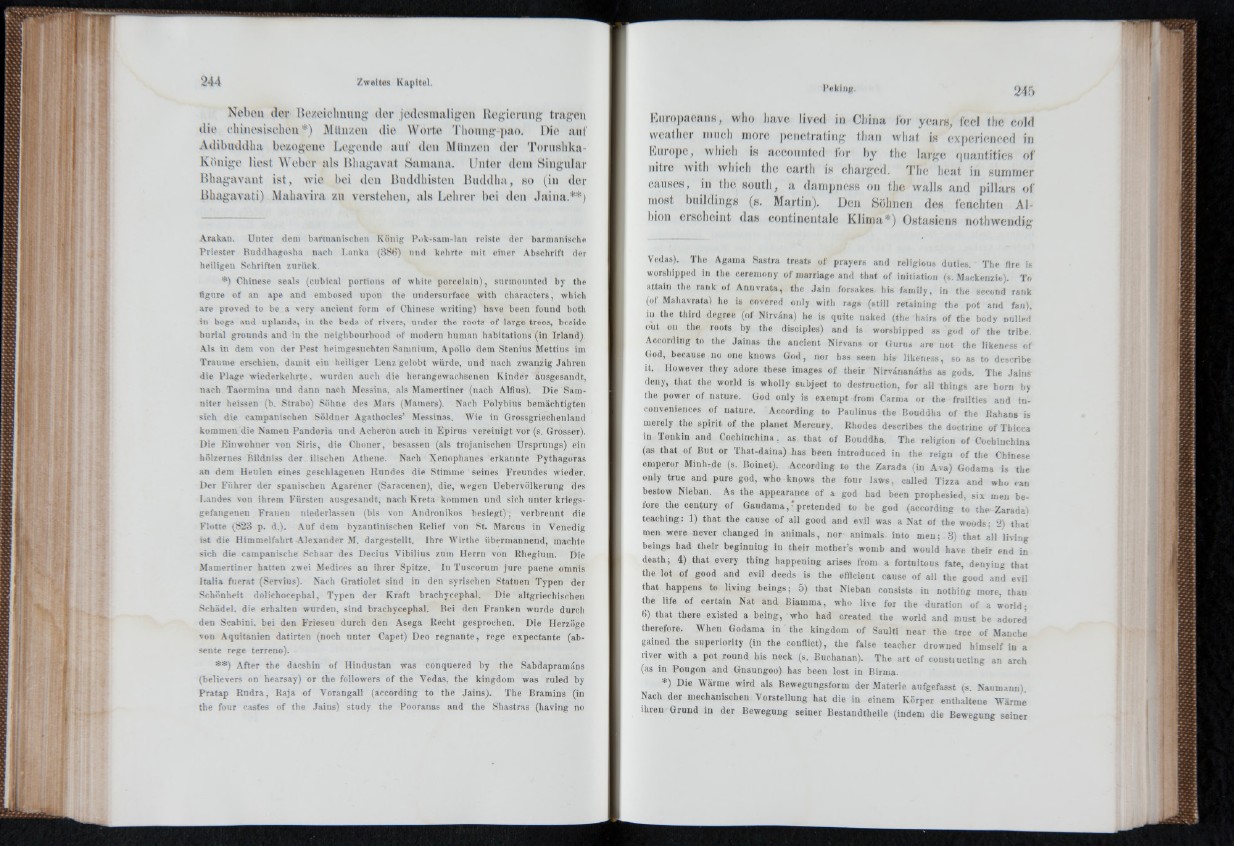
Neben der Bezeichnung der jedesmaligen Regierung tragen
die chinesischen *) Münzen die Worte Thoung-pao. Die auf
Adibuddha bezogene Legende auf den Münzen der Toruslika-
Kßuige liest Weber als Bhagavat Samana. Unter dem Singular
Bhagavant ist, wie bei den Buddhisten Buddha, so (in der
Bhagavati) Mahavira zu verstehen, als Lehrer bei den Jaina.**)
Arakan. Unter dem barmanischen König Pok-sam-lan reiste der barmanische
Priester Rnddhagosha nach Lanka (386) und kehrte mit einer Abschrift der
heiligen Schriften zurück.
*) Chinese seals (cubical portions of white porcelain), surmounted by the
figure of an ape and embosed upon the undersurface with characters, which
are proved to be a very aueient form of Chinese writing) have been found botli
in bogs and uplands, in the beds of rivers, under the roots of large trees, beside
burial grounds and in the neighbourhood of modern human habitations (in Irland).
Als in dem von der Pest heimgesjuchten Samninm, Apollo dem Stenius Mettius im
Traume erschien, damit ein heiliger Lenz gelobt würde, und nach zwanzig Jahren
die Plage wiederkehrte, wurden auch die herangewachsenen Kinder ausgesandt,
nach Taormina und dann nach Messina, als Mamertiner (nach Alflus). Die Sam-
uiter heissen (b. Strabo) Söhne des Mars (Marners). Nach Polybius bemächtigten
sich die campanisehen Söldner Agathocles’ Messinas. Wie in Grossgriechenland
kommen die Namen Pandoria und Acheron auch in Epirus vereinigt vor (s. Grosser).
Die Einwohner von Siris, die Choner, besassen (als trojanischen Ursprungs) ein
hölzernes Bildniss der ilischen Athene. Nach Xenophanes erkannte Pythagoras
an dem Heulen eines geschlagenen Hundes die Stimme ' Seines Freundes wieder.
Der Führer der spanischen Agarener (Saracenen), die, wegen Uebervölkeruilg des
Landes von ihrem Fürsten ausgesandt, nach Kreta kommen und sich unter kriegs-
gefangenen Frauen niederiassen (bis von Andronikos besiegt)1} verbrennt die
Flotte (823 p. d.). Auf dem byzantinischen Relief von St. Marcus in Venedig
ist die Himmelfahrt Alexander M. dargestellt. Ihre Wirthe übermannend, machte
sich die campanische Schaar des Decius Vibilius zum Herrn von Rhegium. Die
Mamertiner hatten zwei Medices an ihrer Spitze. In Tuscorum jure paene omnis
Italia fuerat (Servius). Nach Gratiolet sind in den syrischen Statuen Typen der
Schönheit dolichocephal, Typen der Kraft brachycephal. Die altgriechischen
Schädel, die erhalten wurden, sind hrachycephal. Bei den Franken wurde durch
den Scabini. bei den Frieseu durch den Asega Recht gesprochen. Die Herzöge
von Aquitanien datirten (noch unter Capet) Deo regnante, rege expectante (absente
rege terreno).
**) After the dacshin of Hindustan was conquered by the Sabdapramäns
(believers on hearsay) or the followers of the Vedas, the kingdom was ruled by
Pratap Rudra, Raja of Vorangall (according to the Jains). The Bramins (in
the four castes of the Jains) study the Pooranas and the Shastras (having no
Eiiropaoans, who have lived in China for years, feel the cold
weather much more penetrating than what is experienced in
Europe, which is accounted for by the large (juantities of
nitio with which the earth is charged. The heat in summer
causes, in the south, a dampness on the walls and pillars of
most buildings (s. Martin). Den Söhnen des feuchten Albion
erscheint das continentale Klima*) Ostasiens nothwendig
Vedas). The Agama Sastra treats of prayers and religious duties. The fire is
worshipped in the ceremony of marriage and that of initiation (s. Mackenzie). To
attain the rank of Anuvrata, the Jain forsakes his family, in the second rank
(of Mahavrata) he is covered only with rags (still retaining the pot and fail),
in the third degree (of Nirvana) he is quite naked (the hairs of the body polled
out on the roots by the disciples) and is worshipped as god of the tribe.
According to the Jainas the ancient Nirvans or Gurus are not the likeness of
God, because no one knows God, nor has seen hie likeness, so as to describe
it, However they adore these images of their Nirvänanäths as gods. The Jain s
deny, that the world is wholly subjeet to destruction, for all things are born by
the power of nature. God only is exempt from Carma or the frailties and in conveniences
of nature. According to Paulinos the Bouddha of the Rahans is
merely the spirit of the planet Mercury. Rhodes describes the doctrine of Thicca
in Tonkin and Cochinchina, as that of Bouddha. The religion of Cbchinchina
(as that of But or That-daina) has been introduced in the reign of the Chinese
emperor Minhrde (s. Boinet). According to the Zarada (in Ava) Godama is the
only true and pure god, who knows the four laws, called Tizza and who can
bestow Nieban. As the appearance of a god had been prophesied, six men before
the century of Gaudama, - pretended to be god (according to the-Zarada)
teaching: 1) that the cause of all good and evil was a Nat of the woods; 2) that
men were never changed in animals, nor animals- into men; 3) th at all living
beings had their beginning in their mother’s womb and would have their end in
death; 4) that every thing happening arises from a fortuitous fate, denying that
the lot of good and evil deeds is the efficient cause of all the good and evil
that happens to living beings; 5) that Nieban consists in nothing more, than
the life of certain Nat and Biamma, who live for the duration of a world-
6) that there existed a being, who had created the world and must be adored
therefore. When Godama in the kingdom of Saulti near the tree of Manche
gained the superiority (in the conflict), the false teacher drowned himself in a
river with a pot round his neck (s. Buchanan). The art of constructing an arch
(as in Pougon and Gnaungoo) has been lost in Birma.
• ) Die Wärme wird als Bewegungsform der Materie anfgefasst (s. Naumann).
Nach der mechanischen Vorstellung hat die in einem Körper enthaltene Wärme
ihren Grund in der Bewegung seiner Bestandtheile (indem die Bewegung seiner